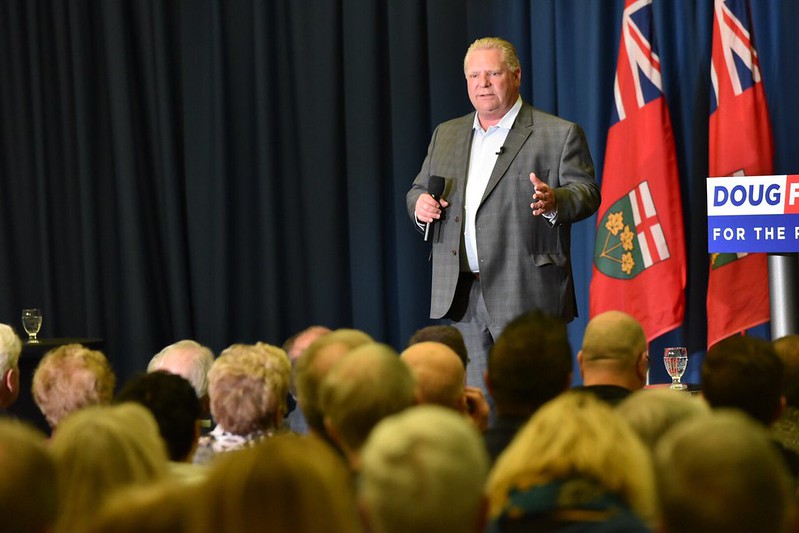There has been stunning news recently about hundreds of older people dying of COVID-19 in long-term care facilities. In some cases, those people had been left alone and drenched in their own urine and feces. This is absolutely shocking and unacceptable. Advocates for the frail elderly and unions representing workers in those facilities which have unions have been saying for years that government and corporate actions have undercut both the quality of care to residents and the health and safety of front-line workers.
It took the pandemic to break an already compromised system. In Canada, almost half of the approximately 1,000 deaths from the virus as of April 14 occurred in long-term care homes. In Ontario, where I live, as of April there were 14 COVID-19 infections in 114 of 626 facilities.
At a news conference, Ontario Premier Doug Ford looked shaken. He said, among other things, that he would make it illegal for individuals to work in more than one care home simultaneously, a situation which potentially allows the virus to either enter or leave the premises with those workers.
But Ford has been a big part of the problem. Having people work in multiple locations has become commonplace primarily because the corporations that own for-profit long-term care homes hire workers part-time so that they can pay them poorly and avoid providing benefits. Until now, the Ford government has turned a blind eye to this. As well, the previous Liberal government was set to raise the minimum wage in Ontario, a move that would have helped many long-term care workers. Yet one of Ford’s first acts when elected in 2018 was to cancel that planned increase.
Ford has much to answer for. The CBC reported on April 14 that in 2019 only nine of the province’s 626 homes received a comprehensive resident quality inspection, or RQI. The CBC reviewed reports from the last five years for all homes in the province. They found that most received RQIs in 2015, 2016 and 2017, but that number dropped to just over half in 2018 and to only nine in 2019. To be blunt, that means that under Kathleen Wynne’s government there were a good number of comprehensive inspections, but Ford cancelled almost all of them.
This kind of behaviour is nothing new for the Conservatives.
Back in 2006, I did the wordsmithing for a report researched by The National Union of Public and General Employees (NUPGE). The report was called Dignity Denied: Long-Term Care & Canada’s Elderly. The document talked about a culture of political and corporate cronyism that was overtaking the long-term care sector. It was occurring throughout the country but was especially prominent in British Columbia, Alberta and Ontario.
Mike Harris, who was Ontario’s premier from 1995-2002, responded to growing waiting lists in 1998 by announcing that more than $1 billion would be spent to create 20,000 new spaces. When the contracts were awarded for construction of beds, 68 per cent of them were handed to the private sector. Three giant companies, Extendicare, Leisureworld and Central Park Lodges, received 40 per cent of the contracted spaces. The public was to pay for building facilities to be owned and operated by corporations to enrich their shareholders.
Provincial election finance records showed that between 1995 and 1999 for-profit long-term care companies donated almost $340,000 to the Ontario Conservative party. That did not include thousands of dollars donated to the provincial leadership campaigns of Ernie Eves, Tony Clement and Jim Flaherty.
One of the biggest players in the private sector long-term care field is Chartwell Retirement Residences. Mike Harris now sits comfortably as the chair of Chartwell’s board of directors and according to Unifor, another union in the sector, Harris pulls down $237,000 a year for this part-time job. Meanwhile, Unifor, says the company pays only the minimum wage to many of its front-line employees.
The 2006 NUPGE report says that the long-term care model promoted by Harris drains the profits from care into the pockets of owners and shareholders. The public sector model provides better care and keeps people safer than a for-profit system governed by the same market forces that motivate software developers, cable companies and fast food chains. Yet, Harris and some other premiers consistently pushed privatization. But the exploitative practices in the privatized for-profit sector have also had a negative and cascading effect upon the quality of care for clients, not to mention the wages and working conditions of care providers.
The major recommendation in NUPGE’s 2006 report was that long-term care should be integrated into the Canada Health Act and become an insured service under the umbrella of Medicare. COVID-19 has exposed a shortcoming in a long-term care system that should be there to protect the health and very lives of our beloved parents and grandparents. That has not been done. It’s time for change.
Dennis Gruending is an Ottawa-based author, blogger and a former member of Parliament. His latest book is Speeches That Changed Canada.
Image: Doug Ford/Flickr



